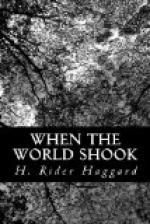“I shall show you first our people in the day of their glory. Look in front of you.”
We looked and by degrees the vast space of the apse before us became alive with forms. At first these were vague and shadowy, not to be separated or distinguished. Then they became so real that until he was reproved by a kick, Tommy growled at them and threatened to break out into one of his peals of barking.
A wonderful scene appeared. There was a palace of white marble and in front of it a great courtyard upon which the sun beat vividly. At the foot of the steps of the palace, beneath a silken awning, sat a king enthroned, a crown upon his head and wearing glorious robes. In his hand was a jewelled sceptre. He was a noble-looking man of middle age and about him were gathered the glittering officers of his court. Fair women fanned him and to right and left, but a little behind, sat other fair and jewelled women who, I suppose, were his wives or daughters.
“One of the Kings of the Children of Wisdom new-crowned, receives the homage of the world,” said Yva.
As she spoke there appeared, walking in front of the throne one by one, other kings, for all were crowned and bore sceptres. At the foot of the throne each of them kneeled and kissed the foot of him who sat thereon, as he did so laying down his sceptre which at a sign he lifted again and passed away. Of these kings there must have been quite fifty, men of all colours and of various types, white men, black men, yellow men, red men.
Then came their ministers bearing gifts, apparently of gold and jewels, which were piled on trays in front of the throne. I remember noting an incident. An old fellow with a lame leg stumbled and upset his tray, so that the contents rolled hither and thither. His attempts to recover them were ludicrous and caused the monarch on the throne to relax from his dignity and smile. I mention this to show that what we witnessed was no set scene but apparently a living piece of the past. Had it been so the absurdity of the bedizened old man tumbling down in the midst of the gorgeous pageant would certainly have been omitted.
No, it must be life, real life, something that had happened, and the same may be said of what followed. For instance, there was what we call a review. Infantry marched, some of them armed with swords and spears, though these I took to be an ornamental bodyguard, and others with tubes like savage blowpipes of which I could not guess the use. There were no cannon, but carriages came by loaded with bags that had spouts to them. Probably these were charged with poisonous gases. There were some cavalry also, mounted on a different stamp of horse from ours, thicker set and nearer the ground, but with arched necks and fiery eyes and, I should say, very strong. These again, I take it, were ornamental. Then came other men upon a long machine, slung in pairs in armoured sacks, out of which only their heads and arms projected. This machine, which resembled an elongated bicycle, went by at a tremendous rate, though whence its motive power came did not appear. It carried twenty pairs of men, each of whom held in his hand some small but doubtless deadly weapon, that in appearance resembled an orange. Other similar machines which followed carried from forty to a hundred pairs of men.




